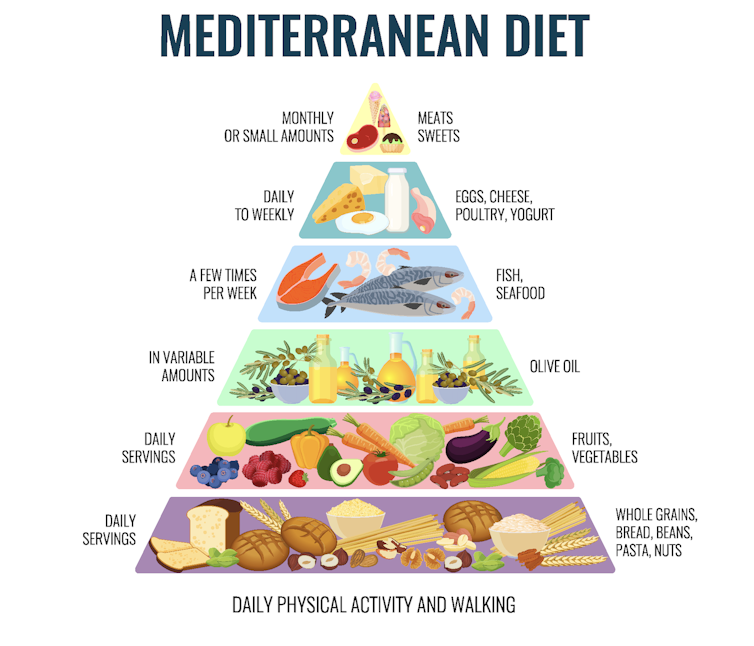Evan Williams, University of Newcastle
Certain foods or dietary patterns are linked with better control of your asthma. Others may make it worse. Depending on what you’ve eaten, you can see the effects in hours.
Food can affect how well your lungs function, how often you have asthma attacks and how well your puffer works.
Here’s what we know about which foods to eat more of, and which are best to eat in smaller amounts, if you have asthma.
Asthma and inflammation
About one in 10 Australians (2.7 million people) have asthma. This makes it the fourth most common chronic (persisting) disease in Australia.
Asthma is an inflammatory disease. When someone is exposed to certain triggers (such as respiratory viruses, dust or exercise), the airways leading to the lungs become inflamed and narrow. This makes it difficult for them to breathe during what’s commonly known as an asthma attack (or exacerbation).
Researchers are becoming increasingly aware of how someone’s diet can affect their asthma symptoms, including how often they have one of these attacks.
Thumbs up for fruit and veg
The Mediterranean diet – a diet high in fruit, vegetables and oily fish – is linked with less wheezing in children, whether or not they have been diagnosed with asthma. Some, but not all, of the studies found this was regardless of the children’s body mass index (BMI) or socioeconomic status.
Eating a diet high in fruits and vegetables is also important for adults with asthma. Two studies found adults who were instructed to eat a diet with few fruits and vegetables (two or fewer servings of vegetables, and one serving of fruit daily) had worse lung function and were twice as likely to have an asthma attack compared to those eating a diet high in fruits and vegetables.

Why might the Mediterranean diet, or one rich in fruit and vegetables, help? Researchers think it’s because people are eating more antioxidants and soluble fibre, both of which have anti-inflammatory action:
- antioxidants neutralise free radicals. These are the damaging molecules produced as a result of inflammation, which can ultimately cause more inflammation
- soluble fibre is fermented by gut bacteria to produce short-chain fatty acids such as acetate, propionate and butyrate, which reduce inflammation.
The Mediterranean diet is also high in omega-3 fatty acids (from oily fish, such as salmon, mackerel and tuna). However a review looked at five studies that investigated omega-3 intake (through the diet or with a supplement) in adults with asthma. None of the studies showed any benefit associated with omega-3 for asthma.
Of course there is no harm in eating foods high in omega-3 – such as oily fish, flaxseeds, chia seeds and walnuts. This has numerous other benefits, such as lowering the risk of heart disease.
Thumbs down for saturated fat, sugar, red meat
Saturated fats are found in highly processed foods such as biscuits, sausages, pastries and chocolate, and in fast foods.
Diets high in saturated fats, plus sugar and red meat, can worsen someone’s asthma symptoms.
For instance, one study found a diet high in these foods increased the number of asthma attacks in adults.

Foods high in saturated fat can have an impact in as little as four hours.
One study looked at what happened when adults with asthma ate a meal high in saturated fat (consisting of two hash browns, a sausage and egg muffin, and a sausage muffin) compared with a meal with similar calories but low in saturated fat.
People who ate the meal high in saturated fat had reduced lung function within four hours. Within four hours, their puffer was also less effective.
These worsening symptoms were likely driven by an increase in inflammation. Around the four hour mark, researchers found an increase in the number of the immune cells known as neutrophils, which play a role in inflammation.
It’s still okay to eat a sneaky burger or some hot chips occasionally if you have asthma. But knowing that eating too many of these foods can affect your asthma can help you make choices that might improve your quality of life.
What about dairy?
One food type you don’t have to avoid, though, is dairy products.
Although many people with asthma report eating dairy worsens their asthma, evidence shows this to be untrue. In fact, one study in adults with asthma found drinking milk was linked to better lung function.
Evan Williams, Postdoctoral Researcher in Respiratory and Nutritional Biochemistry, University of Newcastle
This article is republished from The Conversation under a Creative Commons licence. Read the original article.
Do you have asthma? Have you noticed any triggers? Why not share your experience in the comments section below?

